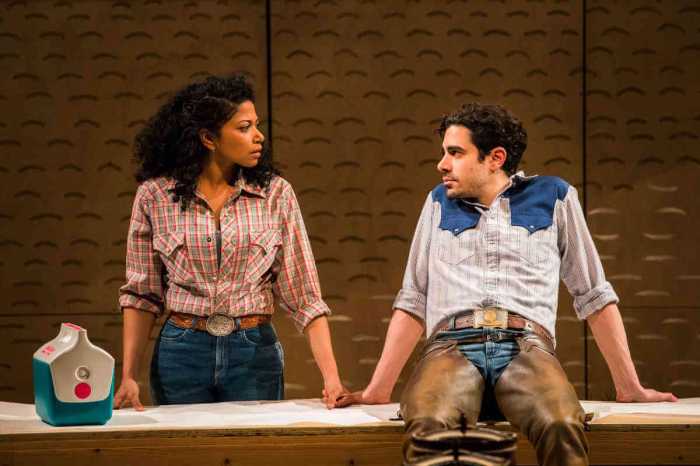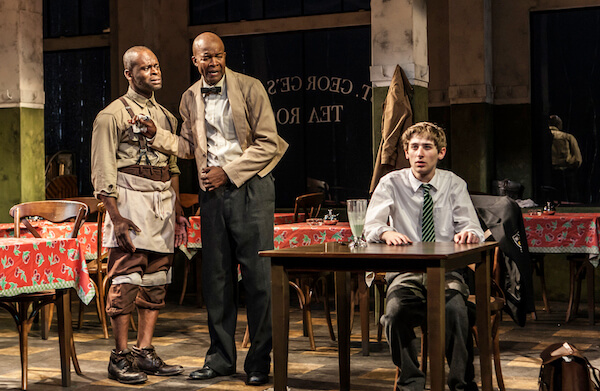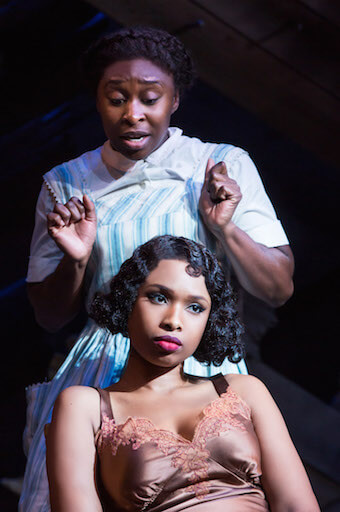Claybourne Elder in “Allegro.” | MATTHEW MURPHY
“Allegro” is neither an easy nor necessarily crowd-pleasing show. First written in 1947, it was Rodgers and Hammerstein’s attempt to reflect tribulations of the common man in a world changing quickly. Its moralistic and sometimes overbearing politics argue for fulfilling the soul rather than pursuing riches. Its score, though boasting some wonderful songs, is fragmented, and the original book is overlong by today’s standards.
Given all these challenges, it’s no wonder the show is rarely produced. As a piece of history, however, it represents the creators’ ongoing efforts to change the musical form. Seen in this context, the new production of “Allegro” at Classic Stage Company is a significant and consistently interesting effort to breathe life into an oft-overlooked work. If, like the current revival of “On The Town,” it often seems like a museum piece, that’s almost an inevitability.
The show tells the life story from birth to maturity of Joseph Taylor, Jr., son of a local doctor, who ultimately has to make the choice of honoring his father’s choice and caring for the people back home or following his more ambitious wife, who wants him to be a famous man in the big city of Chicago. Joe initially follows his wife, but in what we would today call a midlife crisis, realizes that true fulfillment comes from the choice his father made before him.
“Allegro” is a mixed success; “The River” just gets swept away
The production has been directed by John Doyle, so the actors are also the orchestra. This has become Doyle’s calling card, and, quite frankly, it’s starting to wear thin. What once seemed innovative and groundbreaking now seems contrived and gets in the way of the storytelling. There never was a real dramatic justification for actors also being the orchestra in “Sweeney Todd” or “Company,” for example, and now it just seems like a stunt.
However, there are pleasures to be had here. What Doyle has done remarkably well is cast this piece. The principals are all outstanding, as is the choral singing, with the ensemble on stage the whole time functioning as a sort of Greek chorus. Mary-Mitchell Campbell’s music direction and orchestrations are pretty near perfect.
The company as a whole is sublime. Claybourne Elder as Joseph Taylor, Jr. is truly extraordinary. His voice is outstanding, and he manages the clunky transitions of the character from baby to grown man gracefully. Malcolm Gets as his father gives a warm and sensitive performance that never strays into sentiment. Alma Cuervo as beloved mother and grandmother is fine and stoic in the classic Americana mode, while singing beautifully. Jane Pfitsch gets what is probably the best-known number in the show, “The Gentleman is a Dope,” and does it very well. And Elizabeth A. Davis is just right as Jenny, Joe Jr.’s ambitious and selfish wife. She’s an exceptionally good bad egg.
As a piece of its time, along with “Our Town,” to which this invites obvious comparison, “Allegro” is noteworthy. But where “Our Town” radiates warmth and humanity, “Allegro” starts as a much colder piece to begin with — perhaps in line with Hammerstein’s aim of commenting on the quickening rhythm eroding life in the culture around him. Then, this production requires the actors to play instruments, sing, and abide by staging more about artful arrangement of bodies than dramatic narrative, imposing a distance it never overcomes. The most resonant pleasure in this “Allegro” is in the music, and there CSC does very well.
Hugh Jackman gives a fine performance in the deeply flawed “The River.” | RICHARD TERMINE
Self-reverence and obscurity masquerading as emotional depth are typically the province of teenagers clutching a copy of “The Bell Jar” and earnestly scribbling verse. Sadly, it is also the defining conceit of the slight, self-consciously cryptic play “The River” by Jez Butterworth now at Circle in the Square.
The play is remarkable only in that it stars Hugh Jackman in the role of “The Man.” Set in a fishing cabin on what seem to be three different moonless nights when The Man has brought different lovers up for trout fishing, the play is ostensibly about his attempt to find love.
The Man is manly; after all, he guts a real trout right on stage. On the first two of the evenings, we see relationships at the point of either deepening or dissolving. Clearly, they dissolve. Both women seem surprised and resentful that an apparently single, middle-aged man has a romantic history, which is crazy. Or maybe they just feel like they’re being played. Don’t hold me to any of that; I am only guessing at what’s going on.
There’s a lot of labored fishing imagery going on, and Butterworth takes on myths of what it means to be male and questions of whether or not our character is set or changeable in different situations. He clearly wants desperately to be literate, but his play collapses in on itself as it tries to be a contemporary “Rashomon.” The Man is ultimately too underwritten to be interesting, and the women are clichés, so the whole thing just sits there. Kind of like the trout.
Which is unfortunate since Jackman gives a fine performance in this limited role. Ian Rickson’s direction stresses simplicity, and Jackman is so likeable just in his presence that one wonders what’s wrong with these women who find so much fault with him. Butterworth never makes it clear what’s at stake for any of the characters, and so the story spins out like so much fishing line in the dark until we realize there’s nothing there to hook.
ALLEGRO | Classic Stage Company, 136 E. 13th St. | Through Dec. 14 only: Tue.-Thu. at 7 p.m.; Fri.-Sat. at 8 p.m.; Sat.-Sun. at 3 p.m. | $70-$125 at ovationtix.com or 866-811-4111 | 90 mins., no intermission
THE RIVER | Circle in the Square, 1633 Broadway at 50th St. | Through Feb. 8: Tue.-Thu. at 7 p.m.; Fri.-Sat. at 8 p.m.: Wed., Sat. at 2 p.m.; Sun. at 3 p.m. | $35-$175 at telecharge.com or 212-239-6200 | 90 mins., no intermission




































